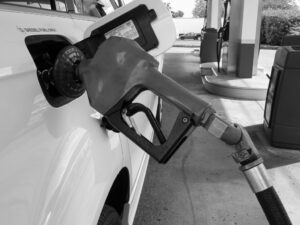Gasoline vs. Diesel Vehicles

You may hear the word “diesel” and immediately think of big semi trucks, tractors and lifted pickups billowing clouds of black smoke across the road, knocking and clattering as if they’re actively falling apart. We don’t blame you. Diesel engines developed a dirty stigma early on in their life that they cannot seem to shake. Most cars on our roads have a gasoline engine, but that’s not to say diesel cars aren’t out there. BMW, Volkswagen, Audi and Mercedes all have several diesel-powered vehicles in their lineups, and you probably wouldn’t even notice if one of them passed you by.
Engine Basics
To understand the main differences between gas and diesel, it is important to know the basics of how all combustion engines operate. To simplify, you put fuel in the tank, the fuel injectors put fuel into the cylinders where it mixes with air, gets compressed by the piston, ignited, and boom! Power is created and transferred to the tires through the driveline. It’s a simple process, but has a lot of complex systems working together to make it all happen.
This is where the differences between gasoline and diesel really come into play. Gasoline is ignited in the cylinder with an electric spark plug, while diesel is ignited solely by the heat created from the engine’s compression. In a gasoline engine, this event is referred to as “knock”, and can be catastrophic, but in a diesel it is necessary as they are built to run on this condition. As a result of this, diesels tend to have reinforced components such as pistons, connecting rods, and engine blocks.
What Effect Does That Have?
Diesel fuel packs more energy per litre than gasoline. This translates to a diesel having as much as 30% more fuel efficiency than a gasoline car, making it a solid choice for those who do a lot of long distance driving. Diesel costs around the same as gasoline at the pump, so your fill ups won’t be significantly cheaper, but the same amount of diesel will get you farther on the road. The energy density of diesel also helps give them more low end torque than gasoline cars, so any towing you do will be a bit easier, and you might feel a bit more grunt off the line or when trying to overtake on the highway.
Despite this, performance cars tend to use strictly gasoline engines. This is because of the added weight from reinforced components, a shorter usable powerband, and lower horsepower figures from the same size engine, despite the higher torque figures associated with diesel engines.
This is not to say that diesels cannot be fast. Many owners of BMW X5 diesels will modify the exhaust system to remove the Diesel Particulate Filter (DPF), and add some software to free up some horsepower. Unfortunately, this does bring the diesel noise and smoke back into the picture. It would be possible for a performance car to be made with a diesel, but there would be an extremely narrow market for such a car, and very high development costs.
It also becomes a matter of tradition.
Could you imagine if Porsche announced the next generation 911 was going to be a diesel? There would be riots in the streets. Well, at least in the street in front of Motor Werke.
Modern Diesels
Diesel engines were once considered to be near bulletproof and much simpler to repair than gasoline engines. This was back when they were the dirty, loud, clattery, smelly, black smoking behemoths we sometimes remember them as. There was little to them, just fuel moving through an engine and coming out as a black cloud. In recent years, diesels have become much more tame and digestible for daily use. They are just as quiet as gasoline engines, do not create any excessive smoke or smells. The unfortunate byproduct of this is that diesel engines are now just as complex, and require as much electronic intervention and regular maintenance as a gasoline engine. Sometimes even more if you consider the DPF systems in the exhaust that are responsible for cleaning up the nasty smoke and emissions of prior diesels. These can be very costly parts to replace if and when they fail.
Which Is Right For You?
This is a tough question to answer, as much of it just comes down to personal preference. Many drivers, enthusiasts especially, simply prefer gasoline over diesel. Diesel vehicles tend to cost more upfront, but can also hold their resale value better. Gasoline vehicles are more common and affordable, but their value can depreciate faster. They also have more of a “clean” buzz around them compared to the dirty reputation of diesels. Those hauling heavy loads will often opt for a diesel pickup, as the low end torque benefits them often, but for the average daily driver, you will likely only notice a real difference at the fuel stations while on road trips. We could go back and forth all day, but no matter which fuel your vehicle takes, the qualified team at Motorwerke has the proper equipment and experienced technicians to take care of you and your vehicle.




